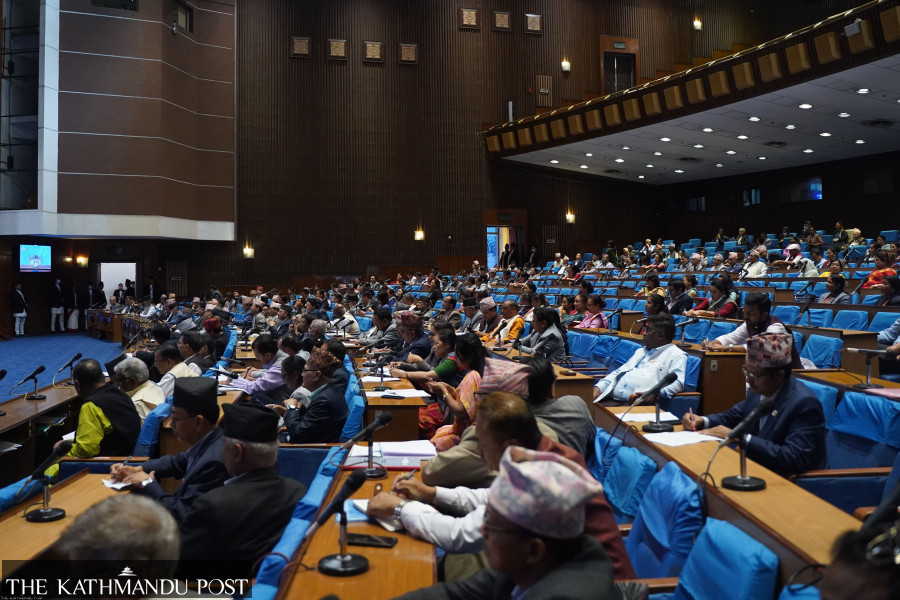Politics
Coalition gears up for winter House session as pressure mounts
CPN-UML chief whip Mahesh Bartaula claims Parliament will convene no later than February 2.
Purushottam Poudel
Amid warnings from opposition parties that they will start the process of summoning a special session of Parliament, the government is now considering calling the winter session shortly. The opposition decried the government’s delay in calling the winter session and alleged attempts to rule through ordinances.
In a joint press conference on Friday, opposition parties demanded that the government immediately summon the winter session or face street protests.
“If the government does not summon the House session, we will take to the streets to build pressure for a special session,” Pushpa Kamal Dahal, chair of CPN (Maoist Centre), had warned the government.
Mahesh Bartaula, the chief whip of the ruling party CPN-UML, said the government would call the winter session within a day or two and that the first meeting would take place no later than February 2.
“The winter session is also the bill session. More than the opposition parties, this session is in the interest of the ruling parties since the government wants various laws to rule effectively,” Bartaula told the Post.
Currently, various parliamentary committees are discussing 15 bills. Four are under review in the State Affairs and Good Governance Committee, five in the Finance Committee, and two each in the Infrastructure Development Committee and the Education, Health, and Information Committee. One bill is being discussed in the Law, Justice, and Human Rights Committee, and another in the Industry, Commerce, Labour, and Consumer Welfare Committee.
Additionally, four bills are under discussion in the National Assembly, the upper house. To make the session effective, the ruling coalition is working to ratify all these bills, including the new ones that emerge during the session of Parliament, stressed Bartaula.
However, neither Shyam Kumar Ghimire, the chief whip of the Nepali Congress, the leading coalition partner, nor the Parliament’s secretariat, could confirm the date of the winter session.
Bu, Ghimire claimed that they have enough bills to discuss in the House when the winter session begins.
Five of the 15 bills being discussed in various parliamentary committees are ready to be presented in the House. Ghimire also claims that a few new bills are expected to emerge in the new session.
The government is also preparing to register a few bills related to splitting the Civil Aviation Authority of Nepal, integrated election laws, and amendments to the Nepal Police Act.
“Apart from this, there are six ordinances issued by the government which need to be discussed in the House before their ratification,” said Ghimire. “The House envisions ratifying over 20 different bills during the winter session.”
After the government introduced at least six different ordinances in the past month, opposition parties have accused the ruling parties of trying to govern through ordinances instead of convening the House session.
The seven opposition parties, which command almost 80 seats in Parliament, met on Friday and agreed to put pressure on the government to call the House session.
As per parliamentary practice, one-fourth of members of Parliament, which would be 69 out of the 275-member Assembly, can request the Speaker to call a special session.
Ekram Giri, spokesperson of the Parliamentary Secretariat, said a special session of Parliament focuses exclusively on the agenda for which it is convened and the session automatically ends after discussing the agenda.
Although the opposition parties have long been demanding the winter session, the government claimed that it was waiting for the federal Parliament to have adequate business. Earlier, although the government had said it would call the winter session of Parliament in the third week of January, that did not happen.
Hitraj Pandey, the chief whip of Maoist Centre, said the opposition parties unanimously demand the winter session and they will push for a special session if the government doesn’t promptly heed their concern.
“We have made our stance clear and are now waiting for the government’s decision to call the session,” Pandey said.
However, UML chief whip Bartaula accused the main opposition party, the Maoist Centre, of using the winter session as a political tool to criticise the government.
“The Maoist Centre lacks a political agenda to stay relevant and is trying to put the government under pressure with the agenda of the winter session, which is not an agenda in itself,” Bartaula further stated. “Parliament will convene not just because of opposition demands, but based on whether there is enough business.”
The President summons and prorogues Parliament at the government’s recommendation. Two sessions cannot be separated by more than six months. The previous budget session ended on September 16.




 10.12°C Kathmandu
10.12°C Kathmandu















